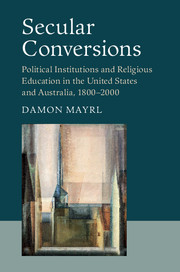 Secular Conversions
Secular Conversions Book contents
- Frontmatter
- Contents
- List of Figures and Tables
- Acknowledgments
- List of Acronyms
- Introduction
- 1 Politics, Institutions, and Secularization
- Part I Forging the nineteenth-century settlement
- Part II The nineteenth-century settlement in transition
- Part III Forging the twentieth-century settlement
- Part IV Implications
- Epilogue: Toward a Twenty-First-Century Settlement?
- Index
Epilogue: Toward a Twenty-First-Century Settlement?
Published online by Cambridge University Press: 05 August 2016
- Frontmatter
- Contents
- List of Figures and Tables
- Acknowledgments
- List of Acronyms
- Introduction
- 1 Politics, Institutions, and Secularization
- Part I Forging the nineteenth-century settlement
- Part II The nineteenth-century settlement in transition
- Part III Forging the twentieth-century settlement
- Part IV Implications
- Epilogue: Toward a Twenty-First-Century Settlement?
- Index
Summary
One of the advantages of a political-institutional approach is that it can help us make sense of the current flux in American church–state jurisprudence. While strict separation remains the law of the land, it has been challenged on multiple fronts in recent years. The Supreme Court has offered increased protection to religious speech, and has shown a willingness to permit some public displays of religious symbols – though it has not yet endorsed them in the public schools. More dramatically, the Court has steadily retreated from its longstanding prohibition on public aid to religious schools. Increasingly, the Court now holds that indirect supports, such as tax credits and vouchers, may be justifiable. While aid paid directly to the school, of the type provided in Australia, remains unconstitutional, funding schemes that provide benefits indirectly to religious schools are no longer forbidden. These decisions do not require states to instantiate public aid programs, but they do give them the freedom to construct programs that could potentially provide extensive indirect support for religious schools.
Thus, to an important – though still somewhat limited – extent, the Supreme Court has denationalized policy on public aid. Today, voucher programs – nearly all of which include religious schools as eligible voucher recipients – are in place in fourteen states and the District of Columbia. But in returning the voucher question to the states, the Supreme Court has unleashed a torrent of litigation in the state courts. Nearly every existing voucher program is being or has been challenged in state constitutional courts, and in many cases voucher initiatives have been struck down as violations of state constitutional provisions. Further complicating matters, some states have begun to experiment with novel means of financing and organizing education that complicate and undermine traditional understandings of strict separation. In light of these trends, some legal scholars have begun to anticipate a profound transformation in church–state policy. Recent decisions, they claim, may portend “a major substantive departure from existing … Establishment Clause doctrine.”
These changes are explicable in terms of the political-institutional theory advanced in this book. Just as the rise of strict separation as a legal principle during the mid-twentieth century was premised upon favorable political coalitions and a variety of institutional supports that made the development of that doctrine possible, so too is separation's current precarious position attributable to changing political and institutional dynamics.
- Type
- Chapter
- Information
- Secular ConversionsPolitical Institutions and Religious Education in the United States and Australia, 1800–2000, pp. 253 - 268Publisher: Cambridge University PressPrint publication year: 2016
